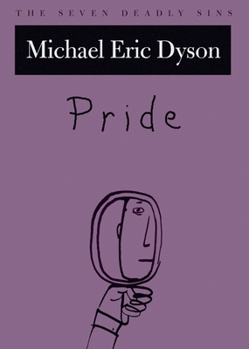Pride: The Seven Deadly Sins
(Part of the Τα Επτά Θανάσιμα Αμαρτήματα (#6) Series and The Seven Deadly Sins Series)
Select Format
Select Condition 
Book Overview
Of the seven deadly sins, pride is the only one with a virtuous side. It is certainly a good thing to have pride in one's country, in one's community, in oneself. But when taken too far, as Michael Eric Dyson shows in Pride, these virtues become deadly sins. Dyson, named by Ebony magazine as one of the 100 most influential African Americans, here looks at the many dimensions of pride. Ranging from Augustine and Aquinas, MacIntyre and Hauerwas,...
Format:Hardcover
Language:English
ISBN:0195160924
ISBN13:9780195160925
Release Date:February 2006
Publisher:Oxford University Press, USA
Length:160 Pages
Weight:0.15 lbs.
Dimensions:0.7" x 5.4" x 7.3"
Related Subjects
African-American Studies Christian Books & Bibles Church & State Education & Reference Ethics & Morality Nationalism Other Religions, Practices & Sacred Texts Philosophy Politics & Government Politics & Social Sciences Religion & Spirituality Religion, Politics & State Religious Studies Social Sciences Sociology Specific Demographics TheologyCustomer Reviews
2 ratings
The evil sin that does good...
Published by Thriftbooks.com User , 18 years ago
Some deadly sins are better than others. Take gluttony. By definition it seethes with excess and over indulgence. And greed, with its inherently selfish motivations, carries no positive overtones whatsoever. How would one depict gluttony or greed in a positive light? Not easily. Twenty first century people, in line with their medieval ancestors, would probably still classify these behaviors as "sins" or at least as "darn bad things". But the other "sins" remain different, and people today would probably only call them "sins" when taken to extreme. Truly, too much anger, sloth, lust, or envy can result in behavior destructive to self and others. But in small quantities they can provide motivation to action or emotional release. Unlike gluttony or greed, each of these remaining sins can be depicted in a positive light when not taken to excess. Pride shares this characteristic. Fatuous overzealous pride makes for a rather unpleasant and potentially self-destructive person. But the right dose of pride can inspire and provide self-worth. Modern pride then swings more to the "less deadly" side of the deadly sin continuum. Michael Eric Dyson thoroughly explores this "better" deadly sin in five short chapters. He draws on his direct experiences of both racial pride and what he has seen of overwrought nationalism. The former represents a potentially good form of pride (again, if not taken to extreme), the latter demonstrates pride's ugly side spilling over into myopic vanity. Dyson sees both forms at work in today's world. The first chapter deals with pride from a historical perspective. Pride once held a notorious spot in the litany of sins. The Greeks, until Aristotle, termed it "hubris" and found it a menace. Much later, Pope Gregory I called it "the root of all evil" and Augustine and Aquinas held equally disparaging views. Pride kept people from God, so went the argument, and opened the door to other sins. Thus, humility became the state in which one fell into grace with the Lord by becoming truly subject (or subordinate). In great contrast to this long tradition, Aristotle held pride in some esteem. Dyson points out the Aristotelian notion of "the proud man... who thinks himself worthy of great things". But this proudness shouldn't stretch too far. Examples of overstretching in the forms of religious fundamentalism, nationalistic arrogance, power, and wealth get discussed. Dyson then turns autobiographical as he discusses his experience with pride. He is proud of his reading and writing skills, and books helped strenghten his will in hard times. The writings of Melville, Dostoyevsky, Morrison, Solzhenitsyn, Ellison, Baldwin, and Martin Luther King, Jr., and countless others helped lead him to his position today of social critic and ordained Baptist Minister. So Dyson has had some very positive experiences with pride. The next two chapters juxtapose white and black pride, in that "white pride is often the vice that makes black pride necessary."
Pride: The Virtuous Vice
Published by Thriftbooks.com User , 18 years ago
Pride has often been viewed as being the worst of the seven sins, yet it is the only sin known to also be a virtue as well as a vice. The first part of this book looks at historical views of Pride, from Plato to Aquinas, who clearly labeled it as a terrible vice, to Aristotle, who not only did not condemn it but also encouraged it. The tone then shifts to racial pride, and the author's take on the damaging affects of identity politics and the negative influences of white pride upon black pride. Though all that is probably a must for those interested in race issues, the gem of this book is the chapter on national pride (My Country, Right or Wrong?). In it, the author examines the differences between patriotism, a love of country and its values, and nationalism, an uncritical support of a country's national and international interests and affairs. He also brings to light religious extremism and the injustice of the American government upon its own people during times of war or crisis. I strongly urge anyone interested in issues of patriotism, racial prejudice, and the war on terrorism to read this chapter.





